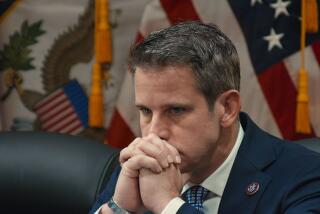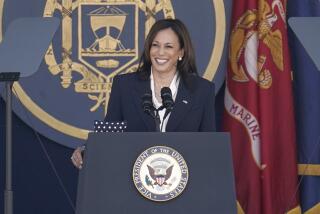A Belated Skewering of Henry Kissinger
Readers of Harper’s magazine this winter may be feeling a sense of ‘60s and ‘70s deja vu. The reason? There, in a two-part, 40,000-word series by journalist Christopher Hitchens, is a rounding indictment of Henry Kissinger, the modern-day Metternich who guided--or, some would say, misguided--American foreign policy from the late-Vietnam era through the Ford administration.
Kissinger has been lauded as America’s most brilliant and resourceful modern statesman and alternately decried as a hawkish, cynical practitioner of Cold War realpolitik.
But Hitchens takes the case contra Kissinger a step further. Arguing in the February and March issues of Harper’s that the former secretary of state and national security advisor should be viewed as a war criminal, Hitchens attempts to pinpoint Kissinger’s alleged role in a host of covert and (he asserts) illegal foreign policy undertakings. With its bravura length, semi-legalistic structure and devotion to matters some already have consigned to history’s ash heap, the piece is something of an anomaly in contemporary American journalism.
The meat and potatoes of Hitchens’ lengthy j’accuse makes for unappetizing reading in the extreme. Among the alleged “crimes” laid at Kissinger’s feet are the prolongation and expansion of the Indochina war; the kidnapping and killing of a Chilean military commander during the events that would culminate in the ouster and assassination of President Salvador Allende and the installation of the Pinochet government; the Greek-sponsored coup in Cyprus in July 1974, which prompted a subsequent Turkish invasion of that Mediterranean island nation; the Pakistani-led massacre in Bangladesh in 1971; Indonesia’s 1975 invasion and rout of pro-independence forces in East Timor; and the car-bombing death of former Chilean Foreign Minister Orlando Letelier and his aide, Ronni Moffit, in Washington, D.C., in 1976.
In each case, Hitchens intimates, Kissinger either knew, should have known and/or took an active role in what transpired.
Kissinger himself has declined to comment on the series.
The section on Vietnam includes not only familiar assertions about Kissinger’s role in the bombing of Cambodia, but an account of his alleged part in subverting the Paris peace talks on the eve of the 1968 U.S. presidential election. Hitchens seeks to demonstrate Kissinger’s involvement in a plan by Richard Nixon’s campaign handlers to get the South Vietnamese government to scuttle the talks, with the understanding they’d receive a better deal with a Republican in the White House.
“I would claim for myself [that] although a lot of people over the years have gone into what happened in the ’68 election and furnished partial glimpses of it, the most complete account is in Part 1 [of the series]--the curtain-raiser, so to speak, for Henry Kissinger,” Hitchens says.
As a kind of sinister addendum, Hitchens questions whether Kissinger might have concurred in a plan to dispose of Elias Demetracopoulos, a Greek journalist who reportedly had inside information about campaign dirty-doings involving Kissinger’s then-employer, President Nixon.
Pugnaciously headlined “The Case Against Henry Kissinger: The Making of a War Criminal,” the series suggests that the Nobel Peace Prize winner belongs in the same court docket as Gen. Augusto Pinochet, the former Chilean strongman who recently evaded extradition by Spanish legal authorities, but now faces possible criminal prosecution in his homeland. Some international law experts believe that Pinochet’s case and others like it may open the door to prosecuting any number of high-level government officials accused of crimes across international borders.
Hitchens says the issue at hand is partly one of American hypocrisy. “What you can’t have is the present state of affairs where the United States appoints itself the moral guardian and then has such an outrageous exemption as this one where new evidence is coming out all the time.”
“A number of people took part in policies that were kind of quasi-legal or illegal at the time,” Hitchens says, speaking from his Washington, D.C., home. “The person who was most directly involved in cases where we have the most evidence was Henry Kissinger. So people who say that would be . . . blaming one man mistake the case of what justice is.”
Harper’s editor Lewis Lapham says the seriousness of the charges warranted Hitchens’ book-length treatment, though it deals with events a quarter-century or more in the past. The series will be published as a book, “The Trial of Henry Kissinger,” by Verso this spring. “My view is, the study of history is to defend the future against the past,” says Lapham. “What we’re indicting here is a system and a way of thinking that is arrogant, undemocratic and arbitrary.”
As Hitchens acknowledges, some of these events have been detailed elsewhere, notably in books by William Shawcross, Seymour Hersh, Anthony Summers, Clark Clifford and others. But with the help of recently declassified documents, Hitchens claims to have broken new ground in some areas while mustering a more complete picture of Kissinger’s putative geopolitical indiscretions. “On the question of novelty, it [the information] wouldn’t be new if you lived in Cyprus or East Timor or Cambodia or Bangladesh. But it would be new if you relied on ‘Nightline.’ ”
Known for his leftish political bearings and scrappy-elegant prose style--John Reed by way of Fleet Street--the British-born Hitchens has a knack for stirring up sacred pots. In his 1995 book, “The Missionary Position: Mother Theresa in Theory and Practice,” he skewered the late Roman Catholic missionary as “an ally of the most reactionary forces” and a “poster girl for the right-to-life wing in America.” A prolific reporter, essayist and critic, he has written books about the Iraqi Kurds and the Elgin marbles and contributes regularly to newspapers including The Times (which also runs Kissinger’s columns).
Hitchens says he began scoping out the series 18 months ago; Lapham then green-lighted the project one night over drinks. “By a nice bit of serendipity, we had no idea when we were going to publish it,” Hitchens says. “So, accidentally, we’re issuing a sort of ‘Welcome Back To Town’ of some sort to Nixon-era and Ford-era Republicans” appointed to George W. Bush’s new administration.
While the series hasn’t exactly prompted calls for a full Senate inquiry, Harper’s has been moving swiftly off newsstands in Manhattan and other major cities. Though Kissinger has kept silent, others have weighed in on his behalf. John O’Sullivan, writing in the conservative National Review, describes Hitchens’ indictment as “nothing more than restaging of leftist anti-Vietnam nostalgia.”
Douglass W. Cassel Jr., director of the Center for International Human Rights at Northwestern University’s School of Law, recently wrote in the Chicago Daily Law Bulletin that, “Hitchens’ tendentious analysis is sloppy to the point of being unfair and irresponsible. Overstating inferences of fact, imprecise and apparently ignorant of the law, he threatens not only to sink whatever genuine case there might be against Kissinger but more broadly to stain the cause of accountability for atrocities.”
But Washington Post staff writer Peter Carlson chimed in with an ironic plea to, “Leave poor Henry alone. He’s such a charming dinner guest. Bringing up these old stories is just so tacky.”
Two weeks ago, the attacks and counter-attacks spilled over from the pages of Harper’s to an auditorium at the College of William and Mary in Virginia, where Kissinger recently was installed as chancellor. Invited by students to participate in a “teach-in,” Hitchens exchanged sharp words with Timothy J. Sullivan, the college’s president, who reportedly called Hitchens’ series “a disgrace” and “a tissue of inaccurate assertions.”
Naturally, Hitchens took issue with Sullivan. But the “teach-in” itself happily reminded him of headier days gone by. “I hadn’t heard that expression for a while. I found it rather moving.”
More to Read
Sign up for Essential California
The most important California stories and recommendations in your inbox every morning.
You may occasionally receive promotional content from the Los Angeles Times.











